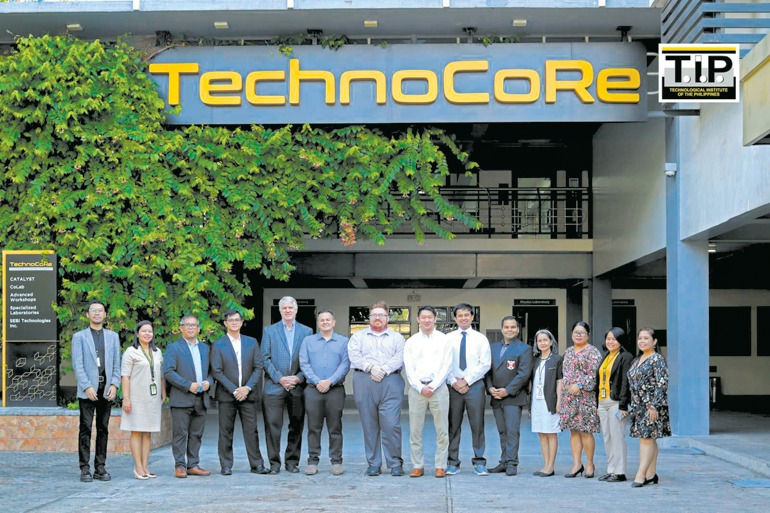[ad_1]

The Technological Institute of the Philippines (TIP) has engaged the services of William Davidson Institute (WDI) at the University of Michigan (UM) to develop a strategic road map for commercializing TIP technologies produced through funded research and special projects.
The commercialization plan will guide TIP researchers in their initiatives along technology transfer. As a component of this partnership, a WDI-UM Multidisciplinary Action Project (MAP) team visited the TIP campuses in Quezon City and Manila from Sept. 18 to 22.
The collaboration seeks to assess the readiness of various externally funded TIP technologies and intellectual properties, and obtain economic value from them down the road through licensing, startup ventures, or corporate spinoffs.
This will be a six-month project between the WDI and TIP. Michigan-based WDI is expected to deliver a comprehensive report on the commercial viability of TIP technologies and how these can be marketed moving forward.
“We’re talking about taking ideas that come out of the industry or out of an academic institution and making them progress to the point that they can end up in the customers’ hands,” said WDI President Dr. Paul Clyde.
This entails a multidisciplinary approach. Hence, there is a need to strengthen the synergy among the engineering and business education departments, the legal consultants of TIP, and all the various units that support the aforementioned objectives.
Advertising
Scroll to continue
“We need to be prepared for the fact that most ideas that come up are likely to fail,” Dr. Clyde noted. “But when you combine it with educational opportunities, it’s not a failure… This is part of a longer journey between TIP and the William Davidson Institute.”
Dr. Clyde conducted learning sessions for TIP Quezon City and Manila faculty researchers during the one-week visit in the Philippines. The MAP team also held discussions with educators and industry partners to conduct market research on two potential business ideas.
“Getting to know the originators of technologies and the resources at TIP TechnoCoRe (Technopreneurship and Collaborative Applied Research) gave us a good launching point for this longer-term collaboration with WDI,” the MAP team said.
Dr. Therese May Alejandrino, director of TIP TechnoCoRe, said engaging WDI-UM and its MAP team in this project offers a necessary “outsiders’ perspective” for TIP to evaluate its existing structures and practices and how those may be improved further through a tailored commercialization plan.
“We always have to be anchored on TIP’s vision of ensuring a better life for the Filipinos. We hope that as we firm up our commercialization road map, in collaboration with WDI and other stakeholders, we will ensure that TIP technologies benefit the Filipino communities,” she added.
Multiple wins at Vietnam conference
Meanwhile, several teams representing TIP prevailed in competitions at the 4th Asia Pacific Conference on Industrial Engineering Operations and Management (IEOM) held last Sept. 12 to 14 in Ho Chi Minh City, Vietnam.
Leading the list of podium finishers this year is the group who designed a technology-enabled service, where students may lease essential devices to their fellow learners at lower cost, so they would no longer have to buy them.
Fresh graduates Mary Jo Santiago, Christine Joy Olanosa, and Angel Shaine Martin presented this concept and called it “Helpy: A Mobile Application System for Engineering and Architecture Tools Rental Business.” It won first place in the Senior Design Project category.
Another team composed of Thea Espinueva, Jhia Angelyck Mavy Cruz, and Vincent Matthew Labrador also placed third in the same competition with their project titled “Filtrar: A Canal Solid Waste Collector and Compactor Machine.” This group created an innovative prototype using Arduino technology that can stand as an alternative solution to collect discarded materials in urban waterways.
Both groups are from TIP Manila and worked with the guidance of Dr. Maria Teresa Mendoza.
Two teams from TIP Quezon City likewise won in the Undergraduate Research competition. Engr. Jaypy Tenerife and his students took second place for developing a food container with spoilage detector. Jan Marielle Bidayan, Arjen Guila Cruz, John Rei Garchitorena, Erika Mae Ople, and Carl Joseph Quintana named their project “WasteNot.”
Lastly, Engr. Ma. Teodora Gutierrez and her students — Mac Friedrich Dantes, Antonio Mari Garcia, Carlo Gonzalez, John Matthew Halog, Alliyah Jade Paguio, and Marinell Santos — claimed third place for their project that caters to the elderly and persons with disabilities (PWD). The group submitted “Ergo Let,” which aims to ease the accessibility of senior citizens and PWDs to conventional public restrooms in Metro Manila.
[ad_2]
Source link
